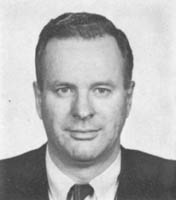John Wilkins
- 1967

Fellowship Title:
- Contemporary German Society
Fellowship Year:
- 1967
A Tale Of Three Cities
Stuttgart March 31, 1968 Mr. Wilkins is an Alicia Patterson Fund award winner on leave from The Tacoma News Tribune, Tacoma, Washington. This article may be published, with credit to Mr. Wilkins The Tacoma News Tribune, and the Alicia Patterson Fund. Question: Herr Wilkins, now that you’ve been here in West Germany almost a year, what are your impressions? Answer: Well, now, you see . . . What I’m trying to say is that I have numerous impressions, many of them contradicting one another. Many of you Germans would agree with me about some of the contradictions, but — and here is the first contradiction — many would not. Naturally. Question: Where have you been most recently? Answer: In Darmstadt, visiting German friends. In Hamburg, listening to the left and right. And in the Stuttgartarea of Paden-Wűrttemberg, whose state elections will be held April 28 and may give a New Hampshire-type preview of some of the 1969 federal election trends. I hope I’m not straining comparisons too much, but one of the minor parties
The German Officer: Commitments Old and New
Kiel Federal Republic Of Germany February 23, 1968 Mr. Wilkins is an Alicia Patterson Fund award winner, on leave from THE TACOMA NEWS TRIBUNE, Tacoma, Washington. This article may be published without special permission. “Whom, then, should the young officer take as a model? Field Marshal von Manstein, who received great acclaim recently on his 80th birthday? Or Guderian? Perhaps Rommel? But how about Jodl, who said in his memorable 1943 review of the military situation that The Reich would achieve final victory because ethical and moral right were on Germany’s side, because Germany had a leader who was a political and military genius, and because Germany had to win?” That question was addressed last December in Munich to some 20 West German officers of field rank, 100 or so junior officers, and about 200 people from education, government, politics and the intellectual community. The speaker, a member of a five-man panel was Dr. Hans-Adolf Jacobsen, assistant professor of political science at the University of Bonn. Since then I have asked basically the same
Building New Bridges
RemagenFederal Republic of Germany January 15, 1968 Mr. Wilkins is an Alicia Patterson Fund award winner, on leave from The Tacoma News Tribune. Permission to publish this article may be sought from The Managing Editor, The Tacoma News Tribune, Tacoma, Washington. The twin towers on the bank of the Rhine at Remagen resemble nearby medieval castles but are not medieval; they are the western terminus of the Ludendorff Bridge. On the eastern bank, at the foot of a cliff, stands an identical set of towers. The bridge itself is gone. Since March 1945, it has been on the bottom of the Rhine with bones of Americans and Germans. This was the “Remagen Bridge” made famous when captured by the U.S. Ninth Army two months before the war ended. It collapsed a few days after its capture, but by then the Americans had established a strong bridgehead and the engineers had thrown up two other bridges. Whether capture of the bridge shortened the war, as was predicted at the time, is a question for military
German Universities: The Pressure For Change
BonnFederal Republic Of Germany December 24, 1967 Mr. Wilkins is an Alicia Patterson Fund award winner, on leave from The Tacoma News Tribune. Permission to publish this article may be sought from The Managing Editor, The Tacoma News Tribune, Tacoma, Washington. Rudi Dutschke, 27-year-old sociology student at the Free University of Berlin, is the best-known personality of West Germany’s far-out left. His reputation steins mainly from the extremism of his student followers in Berlin, where he exploits that city’s special situation. Elsewhere in West Germany he leads merely a faction within a very small minority of radicals — but his influence extends to students who are a great deal more moderate than he is. Though the overwhelming majority of these students are uninvolved in non-university politics, there is a broadly based, responsible revolt against the traditional university system — a revolt whose growing momentum is much in debt to Dutschke’s radicalism. “Our university system is basically the same as under the Kaiser,” a 23-year-old Heidelberg philosophy student told me. “But we are a democracy
The German Right: Old Nazis Call Upon Youth
Remagen Federal Republic Of Germany November 19, 1967 Mr. Wilkins is an Alicia Patterson Fund award winner, on leave from The Tacoma News Tribune. Permission to publish this article may be sought from The Managing Editor, The Tacoma News Tribune, Tacoma, Washington. Well before 9 a.m., delegates began taking seats at long tables in the big auditorium. It was Sunday, Nov. 12, in Hanover, capital of Lower Saxony. Soon waiters carrying trays laden with mugs of creamy-headed beer were moving down the aisles. Brassy, jingling with bells, “Preussens Gloria” broke forth from loudspeakers, followed by “Badenweiler Marsch, “ said to be Hitler’s favorite, though you don’t have to be a “neo-Nazi” or even a German to enjoy it. By 9:30 a.m. the 1500 delegates were seated. Four or five hundred other men and women were standing in the hall because this, the last session of the three-day convention of the National Democratic Party (NPD), was open to the public instead of merely to delegates and newsmen. The atmosphere was relaxed. The previous two days
